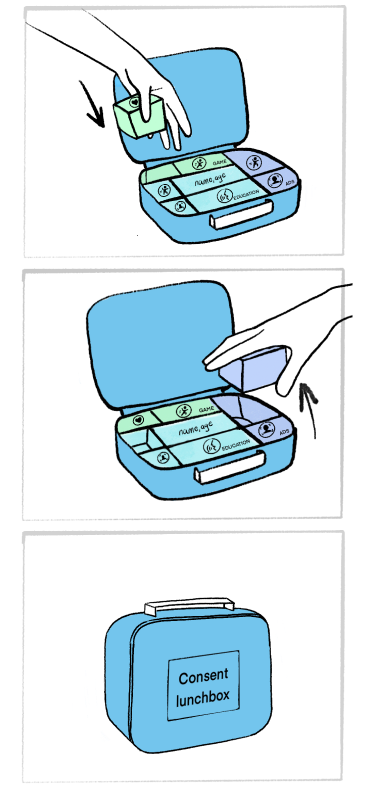How might we...
...provide assurance to teachers about eye tracking so that they can provide informed consent on behalf of students and their parents?
This pattern is a co-created output a Design Jam which took place in Singapore on the subject of Data Transparency and Control in the Metaverse. During the Design Jam, six design teams created simple prototypes which helped deliver better transparency and control over data use in fictional services.
MeshMinds is a creative agency that designs immersive experiences which combine technology and art. Their most recent project, ‘Climate Breakers’, is a narrative-based VR experience that educates people about life in the floating cities of the future – offering a rich and immersive experience through novel interactions, detailed world building and engaging narratives.
MeshMinds’ prototype investigates hierarchies of consent, in particular those found within institutional settings such as schools where multiple parties, such as teachers, parents and students, are each required to provide consent. Their solution addresses different forms of consent that may be required for students to experience ‘Climate Breakers’ in a school setting, including experience vetting and parental permissions.
How might we...
...provide assurance to teachers about eye tracking so that they can provide informed consent on behalf of students and their parents?
Measurement details:
MeshMinds’ prototype explored multi-party consent based on a scenario in which a teacher is unsure about the use of eye tracking within ‘Climate Breakers’, an immersive experience they are considering for their students.
Experience Preview
An experience preview allows a user, in this case the teacher, to demo the experience with notifications highlighting the different data types collected throughout. The notifications contain explanations of the purpose and value of data collection, including who can access and process that data. This provides the information and context needed to make an informed decision on behalf of their students and identify any risks or unsuitable content.
Creating Consent Moments
While previewing the experience, the teacher can choose to place consent moments where they feel they are required for their students. A consent moment is a notification about upcoming content or data capture, causing a break in the experience to ask the student if they would like to proceed or not. This allows the teacher to place breaks throughout the experience based on their personal knowledge of the people they are previewing on behalf of, for example if one of the students has a particular phobia or trigger.
Setting Consent Thresholds
Consent thresholds are measures in physical response that trigger consent moments, for example a particular heart-rate or breathing speed. This allows the teacher to embed safety precautions that are triggered only when a student is thought to be in distress. This provides an extra layer of safety to the experience that responds to individual user needs.

MeshMinds used a combination of XR prototyping tools and techniques including sketches, UI mockups and props to bring their multi-channel solution to life. The resulting prototype, along with those developed by the other participating companies were later synthesized, extracting learnings and insights to develop a series of privacy UX design patterns.
Based on the prototype proposed by MeshMinds, two design patterns were developed – Consent Flags and Consent Lunchbox.
The Consent Lunchbox allows parents and teachers to approve or modify the data types students will be able to share in an XR experience. This enables responsible parties to provide oversight for more vulnerable users to ensure their wellbeing and safeguard them against exploitation. The lunchbox is akin to multi-party permissions setting, where higher up users, in this case teachers, can approve or alter the data types being captured. This configuration is then passed on to the parents, who can approve or modify the captured data types before their children engage with the experience.